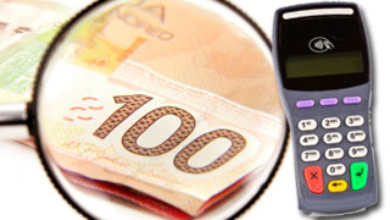Fraud awareness tips for businesses
Counterfeit currency
With little effort, you can help keep counterfeits out of your till, out of your customer’s change and out of all our pockets.
Read more about Canadian banknote security features at the Bank of Canada.
If you suspect that you have been offered a counterfeit note:
- Politely refuse the note and explain that you suspect that it may be counterfeit.
- Inform your local police of a possible attempt to pass suspected counterfeit money.

Payment cards
- Treat PIN pads like cash, out of sight when not in use and locked at the end of the day.
- Know where the PIN pads are at all times.
- Check the serial number to ensure the PIN pad has not been stolen.
- Know your employees.
- Beware of customers attempting to distract employees.
- Shred all hard copy data.
- Remind customers to protect PIN numbers when using them.
- Use familiar ATMs with security cameras.
- Change your PIN numbers frequently.
Wire fraud
Wire fraud has exploded in recent years – scammers will create a spoofed email address pretending to be the CEO or owner of a business. They will send a request to someone in accounting to assist in sending a payment to a client or customer.
The spoof will often appear to be a personal email address, as the executive is away from the office and needs this done as soon as possible. If the recipient falls for the ruse, $50,000 or more will be wired to a suspect bank account.
Directory / supply
Scammers will contact your business by phone or fax. They will pretend they have an existing relationship to trick you into accepting an order for overpriced office supplies or worthless online advertising.
Supplier swindle
If one of your overseas suppliers has their email account hacked, scammers may present you with a story that their usual bank account in Hong Kong has been compromised, and they want you to send your next payment to a new account in London, England.
Credit cards
- Check second piece of identification
- Check signature blocks
- Check security features on cards:
- quality of embossing and quality of holograms
- first numbers on card consistent with issuing company
- name/numbers on card consistent with transaction records
- Be cautious of magnetic strips that do not work
Card not present
With so much legitimate commerce being conducted by phone and online, it is easy to drop your guard. Scammers will use stolen credit card information to place orders for which you will not receive payment. Speak with your processors for increased protection.
Useful resources
- Date modified: